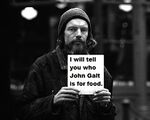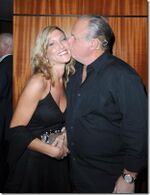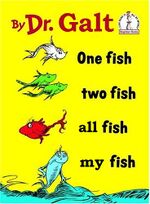Atlas Shrugged
“Who is John Galt?”
“What is John Galt?”
“When is John Galt?”
“Where is John Galt?”
“When will John Galt shut up?”
"Atlas Shrugged" is the biography of John Galt, a man who was more than a man, a man who was more than a myth, a man who you, like others, will be very tired of after you finally meet him. Don't tell him I said that.
The first sentence of the book is "Who is John Galt?", because he is the central character and theme of this book. And, due to it being all about him, you must endure the overly repetitive theme of him throughout this article.
But you won't meet him here. You will meet him here. No, not for him being shy, it's just that as a ruthless, arrogant, unbridled egotist (he paid me to say that), he feels that a biography that doesn't have his own name on it isn't worthy of him.
Please know though, that when you go to the section on John Galt you will have then the opportunity to know everything that you need to know about the story of "Atlas Shrugged", without the pain of having all those philosophical points beaten so far into the ground that they end up being wrote in Mandarin. No, really, the John Galt article in describing him does a fair job of describing the book.
Why? Because when Ayn wrote "Atlas Shrugged" she claimed it was not as a vehicle for her philosophy like most thought. No, the book and her "Objectivist" philosophy were but vehicles for her showing her concept of the ideal man. Guess who he was? Yeah, like I already said, this is a biography of John Galt.
Not good enough? Still don't want to go to his site? Oh, very well. Here you go, info about the book itself. But afterwards, you'd best go to John Galt. Don't make him come to you.
Name of Book[edit]
"Atlas Shrugged"
What, more info? Jeez, you knew the name of the book just to get here. Fine. It was going to be called "The Strike", but that made it too obvious for even the most casual airport reader.
Atlas is the name of the titan who was said to hold Earth on his shoulders, according to Greco-Roman mythology. But, speculated Galtian biographer Ayn Rand, what if this guy, who does so much for us (keeps Earth from falling) and who doesn't get paid (because we're so ungrateful).....well, what if he shrugged?
We'd be screwed, Ayn thought, because then the Earth would fall. We'd all wish we had been grateful to Atlas, then, huh? But it would be too late, huh? Well, that's the premise of this book - that a super genius leads a strike of all the "men of the mind" in protest of all the taxes and regulations those poor dears suffer.
On the other hand, maybe the Earth would keep orbiting the sun as the myth of one essential titan - let alone one essential man - was put to rest a long time ago. That's the premise of reality, and as a certain someone said over and over, "check your premises". More simply put, if an unappreciated genius wants to strike, the rest of us peons may just do fine. At least I've seen unappreciated geniuses on strike in the coffee shops and mom's basements of America all my life, and I've still managed to pay my mortgage on time.
But apparently some men think they are of Atlas-like importance. At least some one particular man does. Guess who? Well, duh, glad you're following along.
Oh, you don't know who? Really? You serious? Huh. Well, go here then.
Book in Brief[edit]
"Atlas Shrugged" put simply - The geniuses are pissed off about all the taxes and regulations so quit and let the nation go to hell without them while they hide out in a allegedly Utopian Paradise called Galt's Gulch. Guess who started it! Dagny is the main protagonist, who is wondering why all the 'men of the mind' keep disappearing. The book shows that without the geniuses, the country collapses and everyone dies. We little guys being too dumb to keep the already invented machines running. (C'mon, have a 'willing suspension of disbelief' here, I've a feeling after Obama's term we'll all be buying "Atlas Shrugged"!)
Now, so you know, the article called John Galt gives the whole story outline, and does it in a way that shows how the actions of these guys are really rather strange. In other words, it's a dash of cold reality to those who take the story a wee bit too seriously.
Catch phrase of Book[edit]
"Who is John Galt?" is not only the first line of the book, it is used throughout the book to connote the despair and hopelessness that the little people feel as the geniuses keep disappearing and the world crumbles.
It is also used as the basis of many fables and tall tales that various characters speak of when trying to explain the phrase, and all such tales have to do with legends pertaining to the unattainable. And they are all told by old ladies, bums, and other non-entities in the book, and it's always Dagny who hears the tales.
In one version, John Galt was a sailor on board a ship that sank, and he saw Atlantis before escaping to tell the tale. In another version, it was how John Galt was the guy who did a search for the Fountain of Youth, searched all over the world, found it on a mountain top, but couldn't bring it down to men.
Ayn Rand hoped it would take off as a popular catch phrase in real life, and it somewhat did. It's used in coffee shops when one pseudo-intellectual wants to show off to another. In other words, it's a mating call for nerds.
It actually was repeated in a Robert Heinlein book, "The Moon is a Harsh Mistress", and has been marketed on bumper stickers and t-shirts. In other words, YES, it really is a mating call for nerds.
Philosophical Points Pitilessly Preached[edit]
- Her philosophy that she named Objectivism, either for her love of Objective Reality, or her love of incessantly objecting all the time, is held to be perfect.
- There is no God, all smart people are atheists. Yes, she plagiarized Nietzscztzschtzshe, but that idea was kind of in the common domain by then.
- Being selfish is good. Helping people...doesn't help them. She means this in a kind of "give a man a fish" versus "teach a man to fish" way. But she carries it so far, that she'd more advocate, "let the guy figure out how to catch whatever he wants to catch, and have nothing to do with him till he's got something to trade". This philosophy makes raising Objectivist children difficult.
- Free Market economics are the only good kind, the rest of the systems are theft of one sort or another. Yes, she plagiarized Frederic Bastiat, but it was probably unintentional. Besides, Bastiat was French.
- The little people need the geniuses, but the geniuses don't need the little people. This is why whenever you see the auto workers strike, that the CEO of Ford just says, "Ha! Great! I'll build the cars myself and save all that money in payroll!"
- The entire point of her book is to get these philosophical points across by showing the exploits of her Perfect Man - John Galt. Or, as mentioned before, it's actually to use those points to show how perfect a man John Galt can be.
Author[edit]
Alyssa Rosenbaum, was an apparently self-hating Russian Jew (She changed her name to Ayn Rand) who was given to cheating on her hubby, popping pills and ranting. And that's just what her fans admit.
She thoroughly enjoyed a form of ass-kissing sycophancy that would have made an oriental potentate gag. She was surrounded by a variety of cool and interesting people from Isabel Paterson and Rose Wilder Lane to Alan Greenspan and Murray Rothbard. She drove them all away, as no one could disagree with her at all.
She was succeeded by Leonard Peikoff, a man who was her heir for the simple fact of being the only person she didn't drive away. His propensity for planting his nose deeply up her behind helped. It was widely known that if Ayn Rand sat down without warning that Leonard's head would be crushed. It was later found in a Congressional investigation that during the entire time Leonard knew Ayn, she never once had to buy toilet paper.
Ayn Rand was a big believer in smoking, and did so most all of her life. There is a goofy explanation from that kiss ass Peikoff about how even in the late seventies there was 'only' statistical evidence of the health hazards, not 'real' facts. In the book "Atlas Shrugged", she actually has a little mini-story about a cigarette vendor at the concourse where Dagny works, and he gives a little speech about how cool smoking is.
And all the heroes of the book smoke, and the 'men of the mind' even have their own special cigarette making factory where the tobacco is heavenly and there is a teeny-tiny dollar sign on each cigarette - in gold. (Sorry, no one could make up shit like that, it's true.) She was known for wearing a cape in public, a gold dollar sign decoration on her, and using a long cigarette holder - guess her doctor had told her to stay away from cigarettes...ba-dump, ting!
Ayn Rand was married to Frank O'Connor, but did cheat on him. He was kind of a vague non-entity, and nothing like the men in the books that Rand wrote of. There's nothing bad to say about him, just a poor schmuck who got roped in for a ride that he could have had no conception of. After the affair he became alcoholic, and...well...that's enough, nothing much humorous to say about him. He's dead, anyway. Buy the book or rent the movie, "The Passion of Ayn Rand" if you want to learn of the whole sorry story. And boy howdy, is it ever sorry. And I say this as a guy who actually kind of admires Rand.
Ayn was once called to the HUAC (House Un-American Activities Committee) ruled by the now demonized boogey man McCarthy. You know, the guy who was witch hunting for commies? You can imagine how fearful Ayn would be to be called, her being from the Soviet Union...well, the jokes on you, Ayn was the only Hollywood figure who went there voluntarily! And, what's more, to testify on behalf of the prosecution!
Time Out from standard Rand bashing[edit]
Ayn Rand actually did write some great stuff about freedom - really - and had many clever thoughts and interesting turns of phrase. I've read some scenes that were down right beautiful. Even had a moist eye, like when Hank helped out Mr. Ward, or Tony tried to help Hank, or poor Cheryl tried to fathom the meaningless evil that was her husband. But she was a writer, not a prophet, and forgot that crucial distinction, as did too many of her fans.
Jumping back into standard Rand bashing[edit]
The above said, she was still a whacko bitch. She once put a curse on her boyfriend Nathaniel Branden's penis. Really. Ask Barbara Branden, the wife (at the time) of Ayn's boyfriend. (Think of it as a wife swap thing, but while Ayn got to sleep with Barbara's hubby Nathan, Barbara did not get to sleep with Ayn's hubby Frank.)
Uh, hey. Yeah, you. The reader who thinks that what I just said was a meaningless non-sequiter. You need to know something. Guess what? Ayn Rand really did put a curse on Nathaniel Branden's penis. Yeah. Really. She was pissed because Nathaniel dumped her, not to go back to his wife Barbara, but to cheat with a younger woman than Ayn. Her life was almost as much of a soap opera as "Atlas Shrugged".
Actually, it was more of a soap opera. And sad to say, Ayn's life was actually much less believable than "Atlas Shrugged" was. Yeah, really.
Type of Book[edit]
A big one. Very big. Over a thousand pages. Three, count them, three sections. Thirty chapters exactly, and it's exactly ten chapters per section. Sections named after Aristotelian phrases, so you know it's a page turner. Actually, it's not even measured in pages, but in pounds. As in "if anyone you know has read it, they will pound you over the head with its ideas".
Okay, it's basically a fiction book, and some have said sci-fi, as it's in a quasi-alternate universe where America has a National Legislature and Head of State instead of a Congress and President. And John Galt invents lots of space age...damn you!
I told you that John wanted you to go and read about him here where it's named after him! He only is asking one price for what you seek, and just like ol' Howard "Red" Roark, if he sets a price, you'd best pay it or move on. Fast. Ask the security guard at that Cortlandt Public Housing Project if you don't believe me. (Sorry, an in joke for the Objectivist's reading this and wishing me in hell. Or Earth. Whatever.)
The Speeches[edit]
As I'm sure your liberal, Obama-loving, tax and spend, democratic, vegan English professor told you, there are a lot of long and boring reactionary speeches in this book. This may come as a shock to you, but this time that granola eating refugee from a Community Theater was right.
There'll be a conversation at some party going on, and all of a sudden a character will go into a two or three page declamation about some topic, such that the hostess would have had him escorted out, or the others would have just wandered off. The most notable party speech (and you can take the word "party" in either of it's meanings) was by our favorite celibate playboy, Francisco D'Anconia, talking about money.
Actually, it was somewhat interesting, in a laissez faire type way, and probably as an economics lecture more entertaining then you're going to hear in your retro-neo-Marxian professor's poli sci class. But a bit out of place at the wedding party and in the book.
There's actually more propaganda in this book then "The Turner Diaries". In fact, one speech is longer than "The Turner Diaries" in it's entirety. Well, that's an exaggeration, but not much of one. The radio address is by...damn you! But whoever it's by, and I'm sure you know, it's SIXTY SIX pages long. (Rand was going to make it six hundred and sixty six pages long to piss off the Christians, but she ran out of ink. And uppers. And Nathanial stopped by for some...'sugar'. *ahem*)
What's that speech all about? Well...shit. Some true believer of a fan counted and there are about 33,000 words in that speech, and while Ayn Rand characterized it as a three hour speech, the same guy figured it would take five hours to say that many words. And you want a synopsis? What, can't break the ol' wallet open to the tune of $8.99 new or a buck used? Or you just need things in small bites, like the intellectual baby you are? Yeah, that's it, isn't it?
Very well, moocher.
The radio speech itself is a synopsis of about 6,000 years of philosophic thought, all of which Ayn Rand disagrees with. She thus shares her own created philosophy, which according to her is about objective reality, rationality, enlightened self-interest, free market economics and romanticism. Or as her detractors would put it: killing the Baby Jesus, destroying faith and love, screwing over your fellow man, sending the little guys to concentration camps, and an artistic style that...well, they're not sure about what her style is, but they're sure it's bad.
Anyway, if some pretentious dork at your local coffee shop tells you that he read the whole speech straight through the first time - or any time - laugh at him. No one has read it all the way through at once, and few have read it all the way through at all. It's just too darn much.
Is it any good? Well, frankly...how do you judge something that is by its very nature sui generis? (Latin, "one of a kind", try and keep up, okay?) You can't really compare it to anything, as nothing else like it has really been tried. She definitely gets her meaning across, whether you like it or not. It would take a person who's not read it to condemn it in its entirety, and from what I've seen of most reviews, it looks like most people have not read it in its entirety.
There's some cool parts, no doubt. Any libertarian will love the talk about the origins of government. Atheists will love her talk about the origins of religion. Her analyzation of the story in Genesis about the Garden of Eden is...well, it's way novel, if far outside any interpretation that any member of the Jewish or Christian faith has ever come up with...
...But.
Well, how to put this?
All in all, it's too much for a fiction book, and the premise that any are actually listening to this whole three to five hour radio speech in a socialistically blighted, starvation wracked America and following along with it is a real stretch. These are the people who in the book cheer for Hank Reardon one day, and scream for the nationalization of his plants the next. The government who moaned about the speech afterward could have saved their breath, 98% of a public school educated American audience would have turned off the radio and put on a Frank Sinatra or Buddy Holly phonograph within three paragraphs of John Gal - damn you! - of whoever's speech.
Cast[edit]
Major good guys:
Dagny Taggart, the woman who ran a railroad, probably the first competent businesswoman in American fiction since Josephine March-Baer ran a Boy's School (oh, for the love of logic, I'm refering to Louisia May Alcott's Jo March from her books "Little Women", "Little Men" and "Jo's Boys", you friggin' illiterate!). She also (Dagny, not Jo) managed to sleep with the three most major male good characters. She's also the one who *sniffs* *sobs* let Eddie die in the desert. Her occupations include building railroads, working overtime and taking it up the ass in brutal sex scenes eerily resembling rape.
Francisco Domingo Carlos Andres Sebastián d'Anconia, who's name is funnier then anything I can say. This was actually an attempt at having a minority in an otherwise pure Aryan book. This guy was in love with Dagny, but didn't clue her in on things till a decade or so passed. He was also a celibate playboy. Yeah. Really.
John Galt, who...damn you! You ain't tricking me!
Hank Rearden, the only cool major character in the book, who gets royally screwed by...oh, no you don't! He was a self-made steel industrialist who hooked up with Dagny and ditched his mean wife, then Dagny left him for....damn you!!
Ragnar Danneskjöld, a not so scary pirate who only robs government ships and gives some people their income tax back in gold. Okay, he's not scary, or actually very probable, but the tax refund in gold is kind of cool! He's from Norway or something, which in the fifties counted as a minority, too. (shut up, you got your own President now!)
Minor good guys:
Cheryl Brooks-Taggart, a bonny Irish lass (see, another 'minority') who had the misfortune to marry Jim Taggart who then gets screwed over when his sorry ass cheats on her with Hank Rearden's wife Lillian.
Tony 'Wet Nurse' (no last name given), a young college grad at Rearden Steel who gets screwed over trying to help Hank Rearden.
Eddie Willers, a homosexual clerk who's actually a monosexual for Dagny (who's dating everyone but him) and who gets screwed over.
Note: There are more major and minor good guys, but those are the main.
Bad guys:
Jimmy Taggart, the President of Taggart Transcontinental and a Washington, D.C. insider who enjoyed Hank's sloppy seconds.
Lillian Rearden, Hank's wife and a woman with enough malignance to be somewhat interesting, if utterly despicable. Still, and don't tell anyone or I'll be kicked out of my college Objectivist Club, I actually have fantasized about doing her. Just to see if I could get her to react where Hank could not!
Fred Kinnan, head of "Amalgamated Labor", and actually kind of a cool guy in a pragmatic, no bullshit kind of way. At least with him he wasn't blowing smoke up your ass. Classic line from Fred Kinnan to the other movers and shakers screwing over America with taxes and regulations, "...you drooling, tear-jerking, mealy-mouthed bastards of the public welfare! Do you think that outside of your college-bred pansies that there's a single village idiot whom you're fooling?".
You may find this hard to believe, but also on the bad guy list were...Whittington S. Thorpe, Wesley Mouch, Floyd Ferris, Chick Morrison, Mort Liddy, Ivy Starnes, Kip Chalmers, Ma Chalmers, Orren Boyle, Cuffy Meigs, Simon Pritchet, Claude Slagenhop, Bertram Scudder, Tinky Holloway, Balph (Yes, Balph) Eubanks, and probably Bugs Meaney (who had a kid of the same name who would be foiled by Encyclopedia Brown). And any other goofy name you can think of.
Bad guys have goofy names in Ayn Rand novels, like Ellsworth Toohey in "The Fountainhead". But this actually isn't all that crazy given that our rulers have had names like W, Tipper, Newt, Gipper, Obama, Skip, Libby etc. Of course, the good guys in the book kind of had goofy names, too, but as you have seen or will see, the good major characters were kind of bad, too.
Ultimate bad guy:
There's only actually one person who screws everyone over, good, bad and indifferent. Guess who? Don't know? Want me to say? God, you really need it spelled out? Well, I'm not telling you here. But I will tell you here. Which should kind of tell you who it was. But I don't want my motor stopped, so you'll have to go there.
Reviews[edit]
Communists and Conservatives hated it, so did their watered down political equivalents, the Democrats and Republicans. Libertarians loved it, as did anarchists, and of all people, Fred Coe. Fred Coe? Well, google for the love of God...er, for the love of logic! But yes, the Spokane Rapist was a fan of ol' John.
Socioeconomic Impact[edit]
The presentation of this text lead directly to the invention of the TL;DR acronym in 1967. Talk Later;DRunk became social encryption to disguise reading the book.
Confused?[edit]
Well that's just too damn bad! Regrettably for your own culturally illiterate ass, those who actually spend time reading books instead of watching TV or playing on the net all day and night are already laughing their asses off. And you're missing out. Loser. When John Galt's strike comes, you are soooo going to be stranded in the desert with Eddie.
Meanwhile, John Galt does enjoy giving condescendingly drawn out explanations, so one is provided at the bottom of the article about him.
See Also[edit]
- Ayn Rand
- "My Struggle" by John Galt Available in German!
- "The Officially ARI Sanctioned Biography of John Galt" by Leonard Peikoff
- "John Galt:The Unauthorized Biography" by Balph Eubank
- "The Hunt for Galt's Soul" by Tom Clancey
- "Chasing the Rainbow:Homoerotic Imagery of Galt's Gulch" by Philip Rearden
- "Deep Soul Angry:How Africans were denied Galt's Gulch" by Louis Farrakhan
- "The Narragansett Brief" by John Grisham
- "Why do you think you think?" by Dr. Floyd Ferris Edited and approved by Dr. Robert Stadler!
- "A critical analysis of Atlas Shrugged" by Dr. Simon Pritchett
- "The Catcher in the Gulch" by J.D. Forrester
- "50 years of influence:The Atlas Shrugged Story", the National Review
- "Dagny's Dilemna", by Danielle Steele
- "A Wife Betrayed", by Lillian Rearden
- "Out of the Ashes:Galt's Gulch" by William Johnstone
- "'I don't share, looter!':A child's guide to Earth's greatest hero" by Madeleine L'Engle Newberry Award Winner!
- "Why yes, it IS all about me, moocher." An Autobiographical Sketch by John Galt








